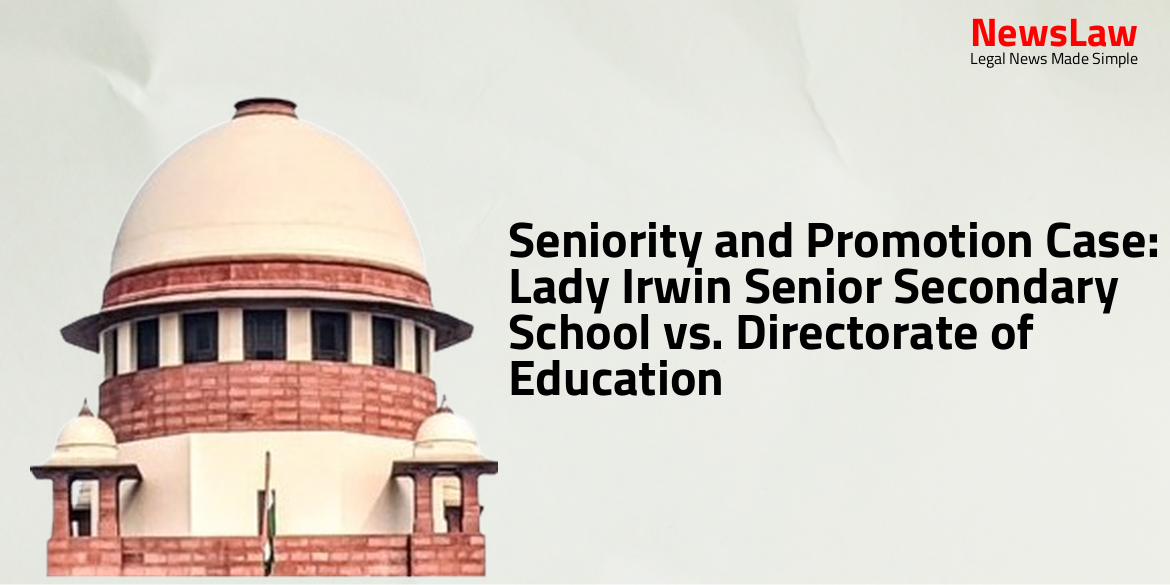In a landmark decision by the Supreme Court of India, the case of Bank of India vs. Private Respondents addresses the crucial issue of educational qualifications in recruitment notifications. The judgment sheds light on the significance of adhering to the qualifications specified in advertisements and the implications of changing criteria midstream. Stay informed about this pivotal ruling that will shape recruitment practices in the banking sector and beyond.
Facts
- Bank of India is appealing a decision favoring private respondents in a recruitment case.
- Two separate appeals have been consolidated as they involve the same legal question and were disposed of by the High Court in a common order.
- The private respondents were provisionally selected pending document verification by IBPS for the respective appellant banks.
- Syndicate Bank Ltd. is the appellant in another related appeal (SLP(C) No.24764/2016).
- The case facts from SLP(C) No.16567/2016 are considered for narration purposes.
- IBPS conducts recruitment processes in the banking sector, including the issuance of recruitment notifications.
- The case pertains to a notification dated 17.11.2014 for the recruitment of Agricultural Field Officers (Scale-1).
- The private respondents in both appeals applied for this post.
- The Division Bench upheld the decision of the learned Single Judge in considering B.Sc. in ‘Agro-Forestry’ an appropriate qualification for the post of Agricultural Field Officer in Banks.
- The Ministry of Agriculture and Farmers Welfare and the Ministry of Finance acknowledged ‘Agro-Forestry’ is covered under the ICAR approved syllabus for B.Sc. in ‘Forestry’ and can be a valid qualification for the position.
- Termination orders withdrawing job offers were set aside, and the appellants were directed to reinstate the private respondents into service.
- The Division Bench disagreed with the appellants’ view and upheld the Single Judge’s order, leading to dismissal of the appeal.
- A judgment from the High Court at Bombay was cited in support during the proceedings.
- A 4-year B.Sc. Degree in Forestry was also recognized as an appropriate qualification for the post of Agricultural Field Officer.
- The selection of private respondents was initially cancelled for not meeting the prescribed qualification, leading them to challenge the termination in writ petitions.
- The learned Single Judge considered the 4-year degree in ‘Forestry’ sufficient, as there is no such program offered specifically in ‘Agro-Forestry’ in the country.
- Referring to information from the ICAR, it was noted that ‘Forestry’ falls under the definition of ‘Agriculture’.
Also Read: Solapur Municipal Corporation vs. Majarewadi Gram Panchayat Employees
Issue
- Whether the courts can declare another qualification as equivalent to the one prescribed in the recruitment notification
- Consideration of extraneous factors by courts for equivalence of qualifications
- Retrospective consideration of newly eligible educational qualifications in ongoing recruitment processes
Arguments
- High Court decision in the case of Kishor Deoramji Gahane addressed the issue of qualification discrepancies between advertisement and recruitment rules.
- The High Court ruled that a corrigendum issued post-advertisement would not be beneficial if the petitioner did not possess the qualification specified in the recruitment notification.
- The private respondents argued that the course for Degree in B.Sc. (Agro-Forestry) was unavailable in the country, leading to an error in the notification’s qualification requirement.
- They referenced Bank of India (Officers) Service Regulations, 1979, specifically Clause 16.9 regarding ‘Special Officers’ and ‘Agriculture Officers’ qualifications, which encompass degrees in Agriculture and/or allied subjects for recruitment/promotion/conversion.
Also Read: Jagdishchandra v. Joint Charity Commissioner & Ors.
Analysis
- Employer cannot change qualification criteria midstream without issuing a corrigendum.
- Court cannot substitute qualifications not included in the original notification.
- Selection Committee should adhere to qualifications specified in the advertisement.
- Issuing appointment letters based on incorrect qualifications can lead to termination.
- Decisions regarding qualifications in recruitment must be based on the criteria in the original notification.
- Changes in qualifications must be applied uniformly to all eligible candidates.
- Failure to include a qualification in the advertisement can disadvantage other qualified candidates.
- Subsequent changes in qualifications should apply to all eligible candidates, not just those already appointed.
- Injustice may occur if appointments are made based on undisclosed qualifications in the original notification.
- The Court cannot provide equivalence related to educational qualifications as it has been settled in previous cases
- The decision in the case of Mohammad Shujat Ali & Ors vs Union of India & Ors (1975) 3 SCC 76 states that equivalence of educational qualifications is a technical question that requires proper assessment and evaluation of academic standards
- The decision must be based on the recommendation of an expert body with the necessary knowledge and expertise
- This view is supported by the decision in the case of Mohd. Sohrab Khan vs Aligarh Muslim University & Ors (2009) 4 SCC 555
- Bank of India directed to provide appointment to Smt. Aarya K. Babu as Agricultural Field Officer or equivalent post if vacancy exists as of today or in the future.
- Decision not to be applied for similar recruitment if employers themselves have permitted equivalence and continued such officers recruited.
- Exercise of discretion under Article 142 of the Constitution to serve the ends of justice in Smt. Aarya K. Babu’s case due to personal difficulties post discharge from service.
- Direction issued in the peculiar facts and circumstances of this case and not to be treated as a precedent for any other case.
- Both appeals allowed with no order as to costs.
Decision
- Orders passed by the High Court of Kerala are set aside.
- All pending applications are disposed of.
- The appointment of the individual will be considered as a fresh appointment from the date of appointment.
- No previous benefit can be claimed by her.
Case Title: ZONAL MANAGER, BANK OF INDIA, ZONAL OFFICE, KOCHI Vs. AARYA K. BABU
Case Number: C.A. No.-006206-006206 / 2019



